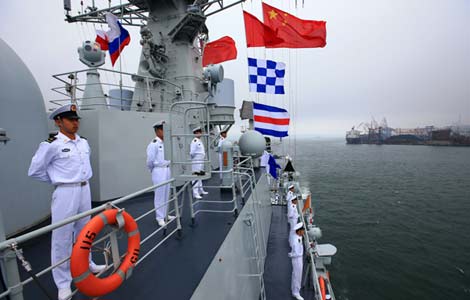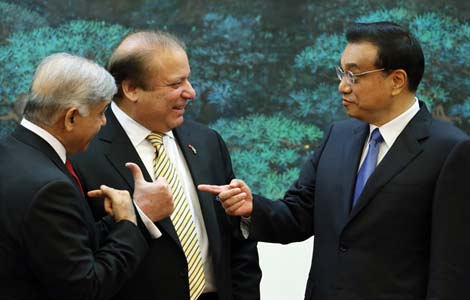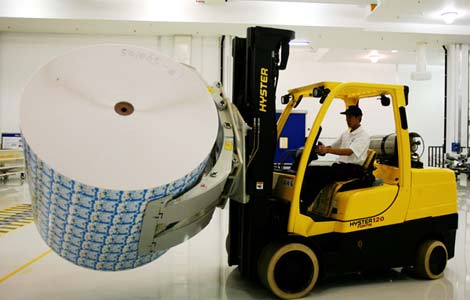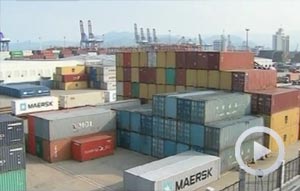High hopes for upcoming China-US talks
Updated: 2013-07-06 01:53
By Li Jiabao (China Daily)
|
||||||||
The upcoming China-US Strategic and Economic Dialogue, also known as S&ED, is expected to make breakthroughs on an investment pact between the world's top two economies, senior officials said on Friday.
The two sides are expected to discuss issues such as China's market economy status, fair treatment for Chinese investments in the United States, loosening of the US restrictions on exports of high-tech goods to China, the spillover effect of the US monetary stimulus through its quantitative easing, as well as the progress of free trade agreements in the Asia-Pacific region.
"I believe the S&ED will see fundamental progress on the investment treaty between China and the US," China's Vice-Minister of Finance Zhu Guangyao told a news conference on Friday.
The two countries officially started negotiations on a bilateral investment treaty in 2008, and the ninth round of talks was concluded in early June.
Chen Deming, president of the Chinese mainland-based Association for Relations Across the Taiwan Straits and former commerce minister, said on Monday that the pact will "set the basis" for global investment rules.
"Sino-US economic ties are intertwined and complicated, and both sides are seriously considering ways to further boost them following the leaders' recent agreements, and also ways to make the economic and trade ties serve as the 'ballast' and 'propeller' for overall bilateral relations," Zhu said.
The two countries will hold their fifth Strategic and Economic Dialogue on Wednesday and Thursday in Washington. The talks will be co-chaired by Vice-Premier Wang Yang and State Councilor Yang Jiechi, who will act as special representatives of President Xi Jinping, as well as US Secretary of State John Kerry and Treasury Secretary Jacob Lew, as special representatives of US President Barack Obama.
During the June 7-8 summit with Obama at the Sunnylands estate in Rancho Mirage, California, Xi called for the establishment of a new type of major-country relationship, including opening new horizons for pragmatic cooperation, while urging Washington to take active steps to relax restrictions on high-tech exports to China and promote bilateral trade and investment structures toward a more balanced future.
Obama responded actively to the proposal, saying that the US is willing to build a new state-to-state cooperation model with China based on mutual benefit and respect.
"We hope the US takes active measures and recognizes China's market economy status as soon as possible," Zhu said. "Meanwhile, we expect the US to loosen its restrictions on exports of high-tech goods for civil use in China, which would also benefit the US."
The US is China's second-largest trade partner and the largest export market. Bilateral trade rose 8.5 percent year-on-year to $484.8 billion in 2012, while the first five months of this year saw bilateral trade increase 6.9 percent from a year earlier to $202.91 billion, according to China's General Administration of Customs.
The US Department of Commerce said on Wednesday that the US trade deficit with China expanded to $27.9 billion in May from $24.1 billion in April as weak global demand, including from slower-growing China, pushed US exports down.
Economists believe that loosening exports of high-tech products to China will effectively balance bilateral trade.

 Train explodes, levels center of Canada town
Train explodes, levels center of Canada town
 Djokovic, Murray to vie for Wimbledon title
Djokovic, Murray to vie for Wimbledon title
 China-Russia navy drill furthers ties
China-Russia navy drill furthers ties
 Famed monkey takes a new direction in New York
Famed monkey takes a new direction in New York
 China, Pakistan ink transport pact
China, Pakistan ink transport pact
 Passenger car sector outlook brightens
Passenger car sector outlook brightens
 Multinationals face increased scrutiny
Multinationals face increased scrutiny
 Kobe Bryant reportedly has highest net worth in NBA
Kobe Bryant reportedly has highest net worth in NBA
Most Viewed
Editor's Picks

|

|

|

|

|

|
Today's Top News
Plane crash lands in SFO, 141 Chinese aboard
China reiterates prudent monetary policy
Companies plan massive investment in Xinjiang
Tetra Pak probed in China
Venezuela offers Snowden asylum
China, Pakistan ink transport pact
24 dead in Egypt protests
High hopes for China-US talks
US Weekly

|

|






